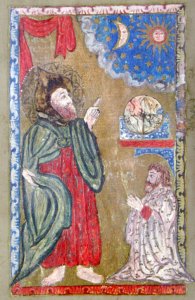Presented By: Center for Armenian Studies
ASP Lecture | Armenian Riddles: Learning How to Read with Medieval Poetry
Michael Pifer, Lecturer, Department of Near Eastern Studies

The 12th century catholicos Nerses Shnorhali faced a crisis: how would he address his flock, seemingly scattered to the ends of the earth, in an accessible and enticing language? And how would he combat popular forms of entertainment, such as the "useless" songs and poetry that circulated in medieval Cilicia, that had no didactic value at a time when he felt Christianity under siege from within and without?
This talk will examine the large body of riddles that Shnorhali composed in Middle Armenian, which had only recently developed as a literary or poetic language. Although Shnorhali's poetic compositions in Classical Armenian depict an absolute opposition to the Islamicate world, his riddles, themselves riddled with Arabic and Persian loan words, tell a more nuanced story. This story would have unfolded at wedding feasts and in wine taverns: boisterous affairs where riddle-reciters playfully teased, corrected, offered hints, and guided their audience to seize upon a correct reading of ambiguous, versified language. Such performances served as popular exercises in hermeneutics, teaching an audience to extract hidden correspondences in the Book of the World. These riddles stand at the threshold of a broader sea-change in Armenian letters: a new poetics, and a covert hermeneutics, that would spread everywhere Armenians lived.
Michael Pifer’s research and writing focus on the connective tissues that run through Armenian, Persian, and Turkish literary cultures, particularly in medieval Anatolia, but also beyond. He received his PhD in Comparative Literature from the University of Michigan in 2014, which awarded him the ProQuest Distinguished Dissertation Award. His current book project, tentatively titled "Kindred Voices: A Literary History of Medieval Anatolia, 1250-1350," seeks to uncover shared cultures of poetic adaptation across Christian and Muslim communities in the pre-modern Mediterranean, as well as to reexamine the manner in which we approach literary history today. This project was supported by a fellowship from the National Endowment for the Humanities in 2016-17.
Photo: Nerses Shnorhali instructing his student. Matenadaran, Yerevan, Ms. 7046.
This talk will examine the large body of riddles that Shnorhali composed in Middle Armenian, which had only recently developed as a literary or poetic language. Although Shnorhali's poetic compositions in Classical Armenian depict an absolute opposition to the Islamicate world, his riddles, themselves riddled with Arabic and Persian loan words, tell a more nuanced story. This story would have unfolded at wedding feasts and in wine taverns: boisterous affairs where riddle-reciters playfully teased, corrected, offered hints, and guided their audience to seize upon a correct reading of ambiguous, versified language. Such performances served as popular exercises in hermeneutics, teaching an audience to extract hidden correspondences in the Book of the World. These riddles stand at the threshold of a broader sea-change in Armenian letters: a new poetics, and a covert hermeneutics, that would spread everywhere Armenians lived.
Michael Pifer’s research and writing focus on the connective tissues that run through Armenian, Persian, and Turkish literary cultures, particularly in medieval Anatolia, but also beyond. He received his PhD in Comparative Literature from the University of Michigan in 2014, which awarded him the ProQuest Distinguished Dissertation Award. His current book project, tentatively titled "Kindred Voices: A Literary History of Medieval Anatolia, 1250-1350," seeks to uncover shared cultures of poetic adaptation across Christian and Muslim communities in the pre-modern Mediterranean, as well as to reexamine the manner in which we approach literary history today. This project was supported by a fellowship from the National Endowment for the Humanities in 2016-17.
Photo: Nerses Shnorhali instructing his student. Matenadaran, Yerevan, Ms. 7046.